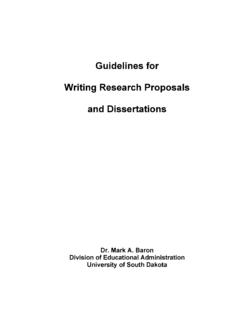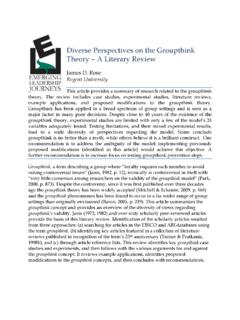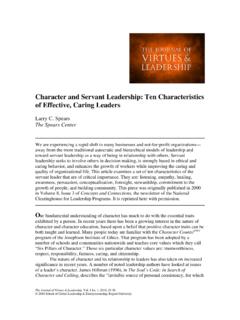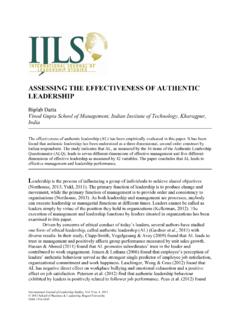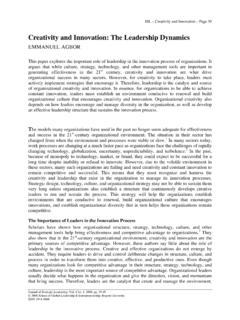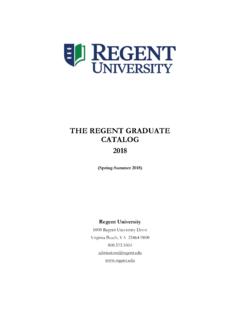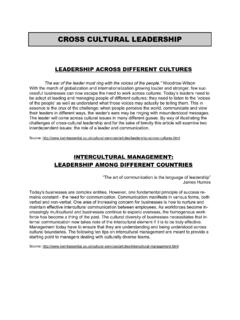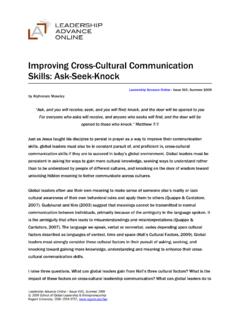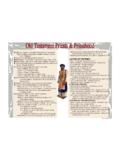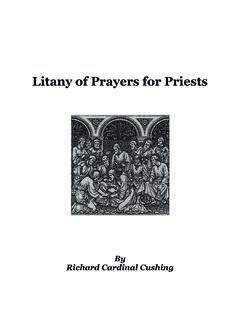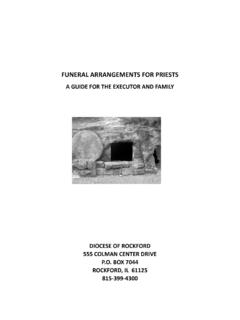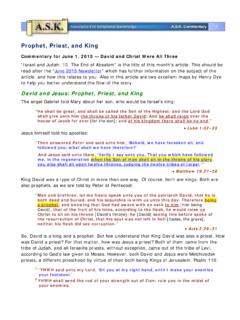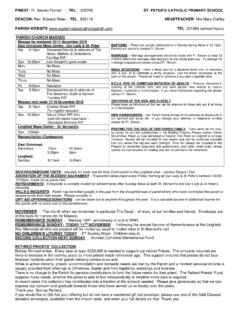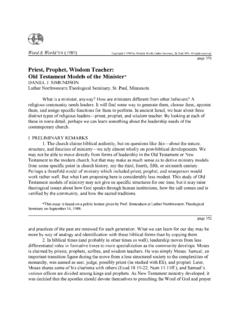Transcription of THE PRIEST-PENITENT PRIVILEGE: ITS …
1 THE PRIEST-PENITENT PRIVILEGE: ITS CONSTITUTIONALITY AND DOCTRINEL ennard K Whittaker*"If you will, be guilty of dishonoring laws which the gods haveestablished in honor."'Eternal laws sometimes clash with their temporal counterparts. Thisstruggle between church and state can be said to be the most formativeconflict of Western civilization. Antigone refused to obey Creon.! ThomasMore would not bow to Henry VIII.' Harriet Tubman assisted escapedslaves despite the law.'An echo of this church-state, eternal-temporal tension can be found inthe PRIEST-PENITENT privilege.' The Supreme Court has never directlyaddressed the privilege's constitutionality. The doctrine supporting theprivilege has not yet been definitively article espouses that the PRIEST-PENITENT privilege's existence isbetter than its non-existence, that it is constitutional, and that it enjoys thesupport of many brief history of the privilege precedes an analysis of its current will be given to the constitutional controversy and the possibledoctrines supporting the , Garza & Whittaker, , Roma, Starr County, Texas.
2 , St. John'sCollege, Annapolis, 1993; , Regent University School of Law, 1998. I thank the followingfor their assistance: Prof. James J. Duane, Kristen Fecteau, Prof. Barbara Massie, XochitlSaenz, and Paul Schemel. I especially thank Prof. Samuel P. Menefee for his infinite assistanceand Rolando Garza, fellow shareholder, for his will to give publication value as part of our legalenterprise. Specific thanks go to E. Todd Wilkowski: without him this article would be a SOPHOCLES, Antigone, in THE COMPLETE PLAYS OF SOPHOCLES 119 (Moses Hadas Sir Richard Claverhouse Jebb trans. 1967) (Antigone to Ismene). Antigone had decided tobury her brother in accordance with the laws of the gods despite an edict by King Creon, heruncle, that the rebellious nephew was to be left unburied; the punishment for burying him wasto be death.
3 See SOPHOCLES, Antigone, in THE OEDIPUS PLAYS OF SOPHOCLES 192 (Paul Rocheed. & trans., 1996). The effect of leaving the body unburied would be that the soul could notcross to the land of the dead. See See id. at See ALsTAIR FOX, THOMAS MORE: HISTORY AND PROVIDENCE 179 (1983).4 See HENIR=rA BUCKMASTER, LET MY PEOPLE GO 213-16 (Univ. of Press 1992)(1941).5 For the purposes of this article, the PRIEST-PENITENT privilege shall be referred to inits historical name since this name appears to be the most widely used. The privilege is calledby several other names in order to either better describe the participants or keep from offendingthe ideologies and sensibilities of -- 13 Regent U.
4 L. Rev. 145 2000-2001 REGENT UNIVERSITY LAW REVIEWI. HISTORY'Most commentators grant the PRIEST-PENITENT privilege's existence inthe common law prior to the Reformation.! Lord Coke, writing in the early1600s, opined that there was a PRIEST-PENITENT privilege in the Articuli Cleriwith an exception for and religion were closely knit when the bishops and clerics staffedthe English courts.' The history of the sacrament of confession is such thatno one knows when it became a confidential act." It is known, though, thatconfession remains confidential in the eyes of the Catholic Church in its1983 Code of Canon Law by which a priest may not reveal the contents ofone's confession upon pain of excommunication.
5 " It seems unknown, aswell, when the privilege as a legal concept appeared in England."While commonly accepted that the privilege existed in CatholicEngland, there is some disagreement as to how the PRIEST-PENITENT privilegedisappeared." Understandably the privilege waned as the Anglican Churchand other Protestant movements, which did not require auricularconfessions, rose to prominence in England. Wigmore espouses that withoutquestion, after the restoration of the monarchy, no PRIEST-PENITENT privilegeexisted at common law." The common law, as understood by the Americana Since there is a nearly definitive thesis on the topic of the history of the PRIEST-PENITENT privilege, see Jacob M.
6 Yellin, The History and Current Status of the Clergy-PenitentPrivilege, 23 SANTA CLARA L. REV. 95 (1983), and a historical account by Wright & Graham, see26 CHARLES A. WRIGHT & KENNETH A. GRAHAM, FEDERAL PRACTICE AND PROCEDURE:EVIDENCE 5612 (1992), this article will confine itself to a summary of the major See 8 JOHN H. WIGMORE, WIGMORE ON EVIDENCE 2394 (John T. McNaughton ); Yellin, supra note 6, at 96. For a more complex view, see 26 WRIGHT & GRAHAM, supranote 6, See 2 EDWARD COKE, INSTITuTES 629 (1628) (discussing Articuli Cleri, 1315,9 , ch. 10, 9 (Eng.)).9 See Yellin, supra note 6, at 97 (citing Edward A Hogan, Jr., A Modern Problem on thePrivilege of the Confessional, 6 LOY.)
7 L. REV. 1, 8 (1951)).'o A Papal letter by Leo I, in the fifth century, reveals confidentiality of confession asa long-held practice. See JOHN C. BUSH & WILLIAM H. TrEMANN, THE RIGHT TO SILENCE:PRIVILEGED CLERGY COMMUNICATION AND THE LAW 42 (3d ed. 1989).1 See 1983 CODE , 1 ("A confessor who directly violates the seal of theconfession incurs an automatic latae sententiae excommunication reserved to the Apostolic See;if he does so only indirectly, he is to be punished in accord with the seriousness of the offense.").Only five excommunications are reserved to the Holy See. See Teresa S. Collett, Sacred Secretsor Sanctimonious Silence, 29 LOY. L. A. L. REV. 1747, 1753 (1996).12 See 26 WRIGHT & GRAHAM, supra note 6, 5612, at See 26 id at 41 (noting that the issue of the PRIEST-PENITENT privilege "has never beendecided in England" (citing STEPHENS, A DIGEST OF THE LAW OF EVIDENCE 171 (1876))).
8 1" See Yellin, supra note 6, at 102-03 [Vol. 13:145 HeinOnline -- 13 Regent U. L. Rev. 146 2000-2001 THE PRIEST-PENITENT PRIVILEGE colonists, makes no mention of the privilege, perhaps based on the greatesteem in which Blackstone was held on this side of the first published American case on the topic was People v. Phillips."In that case, publicized by an attorney arguing for the privilege,"6 the judgebased the privilege in free exercise of religion.' While the First Amendmentof the Constitution could not apply to the states,8 the court found thecommunication protected in New York's version of the Free ExerciseClause." The judge particularly noted the importance of the sacraments inthe Catholic Church" and the damage that would have been done to thefree exercise of religion if the priest were to disclose confidentialcommunication.]
9 " The judge's conclusion was remarkable for the verymodern manner in which he weighed the effects of accepting the privilegeversus its absence." It appeared that the judge was concerned, as well, withdifferentiating American law from that of Mother England."Four years later, another New York court denied the privilege to anAnglican priest based on the lack of a confessional requirement in theAnglican Church.' Due in part to this decision, New York passed the firstpriest- penitent statute in 1828." This statute influenced the passage ofpriest- penitent statutes in other states."In Totten v. United States," the Supreme Court in dicta statedthat suits would not be maintained that required disclosure of Ct.
10 Of Gen. Sess. (1813), reprinted in Privileged Communications to Clergyman,1 CATH. LAw. 199 (1955) (holding that a priest cannot be compelled to disclose to a court thatwhich has been confessed to him in the administration of the sacrament of penance).'8 See Michael J. Callahan, Historical Inquiry into the PRIEST-PENITENT Privilege, 36 THEJURIST 328 (1976), for an account of the lawyer involved in the case. The story is one of self-promotion and nationalism feeding on anti-monarchist sentiment. The attorney, who publishedthe case from his notes, appeared amicus curiae in favor of the privilege. One may read thedecision as published by the attorney in Privileged Communications to Clergyman, supra note15, at 199.
